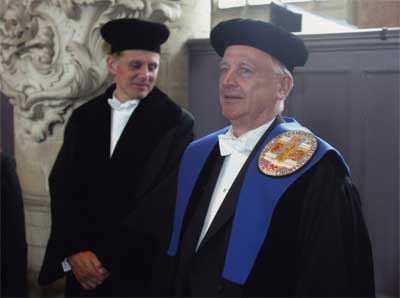Brush up your Latin.
Until the middle of the 19th century, a Ph.D. thesis in The Netherlands would be written in Latin. For example, while Lorentz (1875) and Van der Waals (1873) wrote their thesis in Dutch, their advisor Pieter Rijke wrote in Latin (De origine electricitatis Voltaicae, 1836). Latin still plays a ceremonial role at our University: the end of a thesis defense is announced by the words "hora est" (time is up), and the diploma which is then handed out to the candidate is in Latin.
I had the privilege to serve as "promotor" for the honorary doctorate awarded to Alexander Andreev in 2005, and on that occasion I had to address him in Latin. This required a description in Latin of Andreev reflection, which my colleague Henk-Jan de Jonge expertly provided:

Alexander Andreev receives a honorary doctorate from Leiden University on 7 June, 2005.
Because the very learned man, Alexander Andreev, sharp and diligent investigator of matter at very cold temperatures, through his theoretical ideas has very much promoted the research of Leiden physicists on superconducting metals and liquids, and because, by predicting that for an electron reflected by a superconducting mirror time runs backward, he has given firm proof of his incomparable sagacity, because of these reasons we have become persuaded that he has been most beneficial for the natural sciences. We have therefore decided, now that we are celebrating the 430th birthday of our university, that he deserves to be appointed, elevated and proclaimed as Honorary Doctor.
More recently, I was addressed in Latin myself, by my student Christoph Groth, on the occasion of the 25th anniversary of my own doctorate (28 November, 2009). The hexameters were skillfully composed by his wife Elisa. I was very happy with this unusual gift (although the English translation is quite embarrassing.)
Rejoice, city, located on the shore of the old Rhine, decorate yourself, be happy and blessed today. Because we are celebrating your citizen Carlo, the renowned physicist, who already as a young man ascended to the rank of doctor, he who studies these small electrical devices. Now he ingeniously examines crystal layers. Innumerable are his prizes. May maximal joy always accompany his brilliant and unwearied studies!
My own favorite Latin quote is from Herman Boerhaave (professor of medicine at Leiden University in the 18th century): simplex veri sigillum - simplicity is the sign of truth. That is a guiding principle for my research in theoretical physics.
Carlo Beenakker, December 2009.